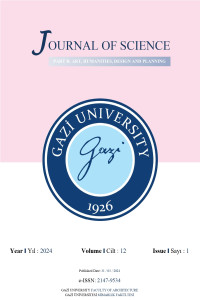Abstract
References
- [1] Lu, W., Wang, J., The Influence of Conflict Management Styles on Relationship Quality: The Moderating Effect of the Level of Task Conflict. International Journal of Project Management, 35,1483-1494, 2017.
- [2] Davidsen, J., Ryberg, T., Bernhard, J. (2020). “Everything Comes Together”: Students’ Collabo-rative Development of a Professional Dialogic Practice in Architecture and Design Education. Thinking Skills and Creativity, 37.
- [3] Chiocchio, F., Forgues, D., Paradis, D., Iordanova, I., Teamwork in Integrated Design Projects: Understanding the Effects of Trust, Conflict, and Collaboration on Performance. Project Man-agement Journal, 42, 78-91, 2011.
- [4] Crosbie M.J., The Schools: How They’re Failing the Profession (and What We Can Do about It), 1995.
- [5] Arditi, D., Günaydın, H. M., Factors That Affect Process Quality in the Life Cycle of Building Projects. J. Constr. Eng. Manage.124/3, 1998.
- [6] Tucker, R., Teaching Teamwork in Design: A Framework for Understanding Effectiveness in Student Teams. Collaboration and student engagement in design education, IGI Global, Her-shey, Pa.,1-27, 2017.
- [7] Ali, A. K., A Case Study in Developing an Interdisciplinary Learning Experiment Between Architecture, Building Construction, Engineering and Management Education. Engineering, Construction and Architectural Management 26, pp. 2040-2059, 2019.
- [8] Emmam, M., Taha, D., ElSayad, Z., Collaborative Pedagogy in Architectural Design Studio:A Case Study in Applying Collaborative Design. Alexandira Engineering Journal, 58, 163-170, 2019.
- [9] Abdulwahhab, M.L., Hashim, B. H., The Effect of Cooperative Learning Strategy on the Engagement in Architectural Education. 3rd International Conference on Sustainable Engineering Techniques (ICSET 2020), 2020.
- [10] Rahim, M.A., Magner R.N., Confirmatory Factor Analysis of the Styles of Handling Interpersonal Conflict: First-Order Factor Model and Its Invariance Across Groups. Journal or Applied Psychology 80/1,122-132,1995.
Abstract
Construction is a collaborative process where different stakeholders work together for the same goal. However teamwork is one of the essential points of construction process, architectural education is mostly designed as an individual process or team consists of architecture students. There are many advantages for architecture students to work in a collaborative environment from different professions. However, as in professional life there are some negative features of teamwork as conflict. Conflicts in a group can have both positive and negative effect but if they do not managed carefully, the relationship between two parties can be damaged. This study is conducted to analyze the conflict management styles of architectural students in an interdisciplinary collaborative project-based environment. The project was designed with teams of students that are from the department of architecture and computer engineering. When the results are analyzed , it has been found out that most of the architecture students choose integrating and compromising conflict management styles.
References
- [1] Lu, W., Wang, J., The Influence of Conflict Management Styles on Relationship Quality: The Moderating Effect of the Level of Task Conflict. International Journal of Project Management, 35,1483-1494, 2017.
- [2] Davidsen, J., Ryberg, T., Bernhard, J. (2020). “Everything Comes Together”: Students’ Collabo-rative Development of a Professional Dialogic Practice in Architecture and Design Education. Thinking Skills and Creativity, 37.
- [3] Chiocchio, F., Forgues, D., Paradis, D., Iordanova, I., Teamwork in Integrated Design Projects: Understanding the Effects of Trust, Conflict, and Collaboration on Performance. Project Man-agement Journal, 42, 78-91, 2011.
- [4] Crosbie M.J., The Schools: How They’re Failing the Profession (and What We Can Do about It), 1995.
- [5] Arditi, D., Günaydın, H. M., Factors That Affect Process Quality in the Life Cycle of Building Projects. J. Constr. Eng. Manage.124/3, 1998.
- [6] Tucker, R., Teaching Teamwork in Design: A Framework for Understanding Effectiveness in Student Teams. Collaboration and student engagement in design education, IGI Global, Her-shey, Pa.,1-27, 2017.
- [7] Ali, A. K., A Case Study in Developing an Interdisciplinary Learning Experiment Between Architecture, Building Construction, Engineering and Management Education. Engineering, Construction and Architectural Management 26, pp. 2040-2059, 2019.
- [8] Emmam, M., Taha, D., ElSayad, Z., Collaborative Pedagogy in Architectural Design Studio:A Case Study in Applying Collaborative Design. Alexandira Engineering Journal, 58, 163-170, 2019.
- [9] Abdulwahhab, M.L., Hashim, B. H., The Effect of Cooperative Learning Strategy on the Engagement in Architectural Education. 3rd International Conference on Sustainable Engineering Techniques (ICSET 2020), 2020.
- [10] Rahim, M.A., Magner R.N., Confirmatory Factor Analysis of the Styles of Handling Interpersonal Conflict: First-Order Factor Model and Its Invariance Across Groups. Journal or Applied Psychology 80/1,122-132,1995.
Details
| Primary Language | English |
|---|---|
| Subjects | Architecture Management |
| Journal Section | Architecture |
| Authors | |
| Publication Date | March 31, 2024 |
| Submission Date | December 11, 2023 |
| Acceptance Date | March 29, 2024 |
| Published in Issue | Year 2024 Volume: 12 Issue: 1 |


